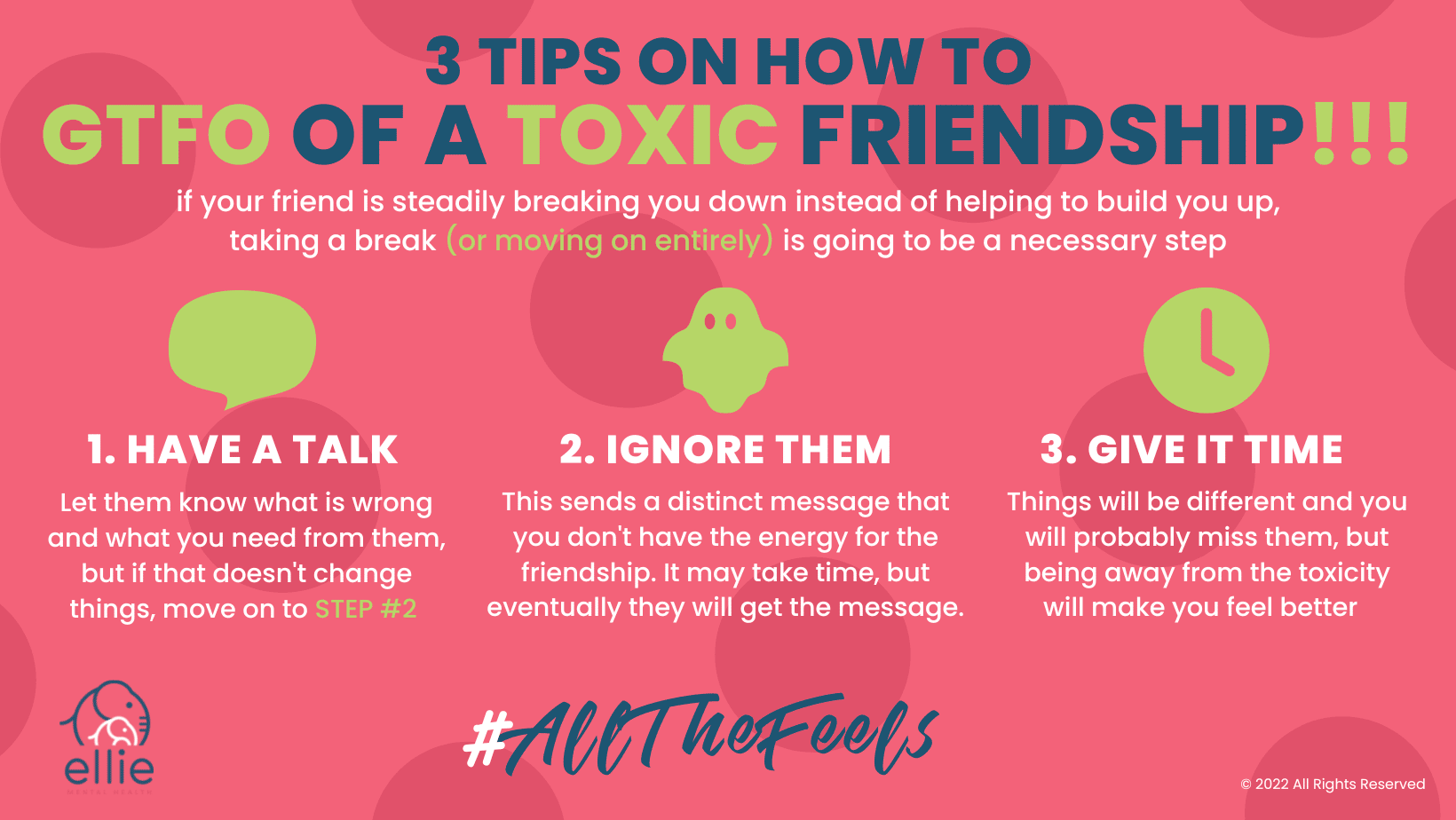Friends enrich our lives as we grow, learn, and deal with life. And several studies have shown that the more quality friendships you have, the longer you may actually live! But how do you know if your friends are helping you to live your best life or dragging you down?
Toxic friendships can cause damage that can take years to recover from. The worst part is the red flags might be everywhere, even waving right in your face. But unless you know the signs of a toxic friendship, you may find yourself trapped in one without realizing it.
While no friendship will be all unicorns and rainbows, it’s important to recognize the signs of a toxic friendship so that you can GTFO before it causes too much damage.
Do you think you’re involved in a toxic friendship, and you need help getting out? Contact the experts at Ellie Mental Health for support today.
What Is a Toxic Friendship?
Feeling pressured? Do you find yourself doing everything for someone and getting ghosted when you need a favor? Do you find that it might even be dangerous to disagree at times? Toxic friendships are full of these tell-tale signs along with many others. In fact, these one-sided friendships are often more take than give, but sometimes the signs can be much more subtle and hidden.
A toxic friendship is one where compassion is missing – where the feeling of togetherness and common ground has been lost. And if you’re really wondering if you’re in a toxic friendship despite that red flag hanging right in front of you, ask yourself these questions:
- Do you no longer immediately respond to texts and calls, or avoid them altogether?
- Is the thought of hanging out with your friend exhausting in itself?
- Does communicating with your friend cause you anxiety?
- Have you been making excuses not to hang out with them?
If you answered yes to any of the questions above, then chances are your friendship has become toxic and it’s time to do something about it.
Toxic Character Traits
Let’s be honest here. All of us have our own odd quirks and idiosyncrasies, and so do all our friends. Maybe you like dipping your pizza in oatmeal. Gross. But these are the things that make us unique and act as attractors when we set out to build relationships. Yes – even the oatmeal part.
The truth is a toxic friend has more than just the occasional odd quirk. Sure, we all have bad days from time to time, but a toxic friend has an uncanny way of making your day turn out bad all too often – even if it began beautifully.
Toxic friends also tend to have narcissistic traits as well. Think about it like this. Do they always try to come off as the hero – or the victim? And do they rarely (if ever) admit fault? You may even be dealing with a toxic narcissist – a toxicist!
Beyond this, consider if your friend has the following traits:
They’re Threatened by Your Other Friends
We all have the freedom and the right to have as many friendships as we choose. And we have the right to give our time to whomever we please. After all, it’s your life, right? But a toxic friend may attempt to get in between you and your other friends.
Toxic friends want to steal the spotlight and hoard all your attention. And if you’ve caught backlash from your friend when you haven’t made yourself available, and they begin badmouthing your other friends, it’s probably time to tell them to kick rocks and focus on the positive relationships in your life.
They Always Know What’s Best for You
It’s nice to get advice from time to time. And often, we need advice from others to help us overcome obstacles in life. But if you have a friend who’s always telling you what you should do and downplaying your decisions, then you may want to hit the mute button on your friend and listen to your own advice.
Toxic friends may hear you out, but then they’ll turn around and tell you that you’re foolish for not doing things their way. But the point is they fail to remember that you’re you, and you have the right to do things your own way.
They’re No Longer Fun to Be Around
This is probably the most obvious part of a toxic friendship. And while we all go through our bad hair days and moments of temporary insanity, a toxic friend will show their true character eventually and the slump will never end – like a bad hair year.
Toxic friends also have a way of charming you when they need to. But this charm typically fades over time. And if you find yourself exhausted after an outing, after a phone call, or wanting to flush your phone down the toilet whenever you see a text, then it’s time to GTFO before your life becomes a total nightmare.

Steps for Breaking Up with a Toxic Friend
Just like any relationship, severing a friendship can be a difficult process. After all, you’ve likely invested time and emotional energy into your friendship, and losing a friend never lands in the category of “good feels.” But if your friend is steadily breaking you down instead of helping to build you up, taking a break (or moving on entirely) is going to be a necessary step.
Step 1: Have a Talk
There’s a very real possibility that your friend isn’t aware of his or her toxic behavior. And as a good friend who genuinely cares, you should try to confront them about their actions and give them a chance to mend things before you sever ties completely. Tell them they’re being a drag. Let them know that they totally suck! If anything, airing it out will create space.
If after your talk nothing changes, then it’s time to move on to step 2.
Step 2: Ignore Them
Believe it or not, “ghosting” has become the preferred way to handle difficult situations when it comes to relationship problems. And even though this may seem juvenile, this is also a way to send a distinct message that you no longer have the time or the energy to deal with a toxic friendship – especially after you’ve told them that they suck.
Unfortunately, toxic friends are tragically stubborn and may not even realize they’re being ghosted. But eventually, those texts and calls will stop.
Step 3: Give It Time
You may feel like you’re missing a part of your life – and you are. But that part of your life was eating away at you and keeping you from living your best life. In fact, the more time you take to be by yourself and away from toxicity, the better you’ll eventually feel. Remember, you can always make new friends and seek out positive relationships, too – once you’re ready.
After You’ve Moved On
Moving on can be tough, but what should you do in order to fill the void? Should you head to the store and buy a bucket of ice cream? Do you go crazy on Amazon and order 100 pairs of pajamas because you’re never going to leave the house again? Should you cry it out while binge-watching all 10 seasons of Friends?
Chances are, all of those options will only make things even more depressing and toxic. So, here’s what you should do.
- Find support
- Get out of your comfort zone
- Try new activities
- Join groups
- Do what you love – and more of it!
- Focus on your new life and how better it is
Trying to find closure may be difficult at first, but it’s a necessary step when you remove someone from your life. And there are even a few things that you can try to help speed up the process.
First, you may consider writing a letter to your friend thanking them for their friendship over the years – or even sending a long text. Be sincere and as honest about your feelings as possible, and detail exactly why you chose to move on without them in your life. And the best part of this strategy is, you don’t have to mail the letter or send the text!
Sometimes, getting all your thoughts out is a way to purge those toxic feelings and emotions. And of course, you could mail the letter, but would you really want to waste the stamp?
You may also decide to turn the tables and begin doing all those things that your friend never wanted to do with you. In a sense, this little act of rebellion can be just the same as closing the door for good – affirming yourself that you’re in control of your own life.
Time To Make New Friends
Once you’ve had time to heal, it’s time to put yourself out there again and start building new relationships. And even though it may not be as easy to make friends as an adult as it was as a child, there are many paths you can take to making new friends and having positive, lasting relationships.
Focus on having positive experiences and doing what you love to do. Eventually, you’ll meet other like-minded people and become friends. And when you’re focusing on the moment, and on what you love, chances are you’ll naturally block out any toxicity that may come your way.
Remember, toxic relationships may masquerade as true friendships, but now that you know the signs, you’ll know how to spot a toxic friend and GTFO before it’s too late.
Need help severing ties with a toxic friend, or with moving on after you’ve said goodbye? Contact the experts at Ellie Mental Health for support today.


